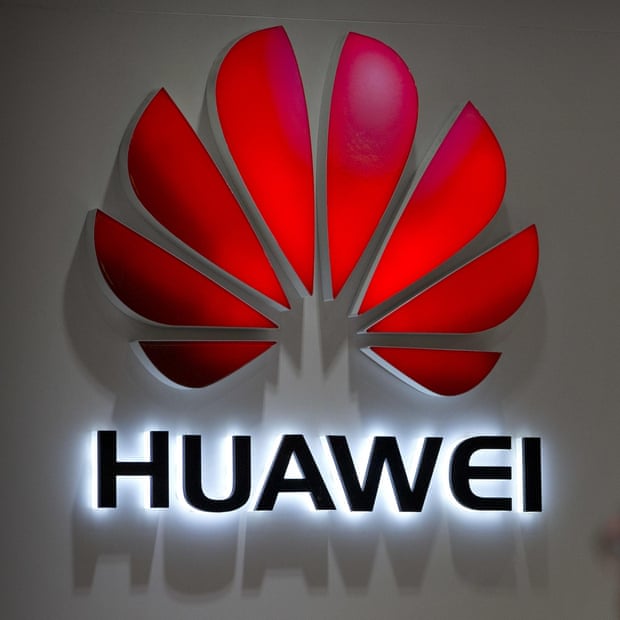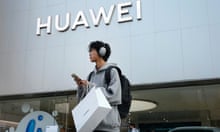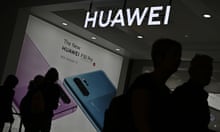Former ministers have sounded their final warnings to Boris Johnson about the Chinese telecoms firm Huawei ahead of his expected decision on whether it will play a part in the UK’s 5G network.
The prime minister will chair a meeting of the national security council (NSC) later on Tuesday before making a judgment on the firm’s future in the country after months of concern around security, including from the US president, Donald Trump.
A number of former senior government figures and MPs voiced concerns just hours before the meeting, urging that if Huawei is involved in rolling out the 5G infrastructure then it should be time-limited and the US and UK must come together to work out their own 5G technology.
Q&AWhat is 5G?
Show
5G is the next generation mobile phone network and it promises much higher connection speeds, lower latency (response times) and to be more reliable than the creaking 4G networks we have now.
It will be much faster, with download speeds 5-10 times quicker than 4G to start with, meaning a movie will download in seconds rather than minutes. Over the next few years it should become even faster, as the technology matures. It will also have lower latency, the time it takes for something to happen: tap a link and the download will start faster.
But perhaps the most important thing 5G will immediately do for users is increase the carrying capacity of the masts, meaning more people can connect at the same time.
Despite the International Commission on Non‐Ionizing Radiation Protection declaring it to be safe for humans, the technology has been criticised by conspiracy theorists, including celebrities, who have associated it with the 2020 coronavirus outbreak, leading to vandalism attacks on 5G towers.
Samuel Gibbs, consumer technology editor
The former defence minister Tobias Ellwood told Sky News: “If we are going to introduce Huawei into 5G I would put a time bar on it. I would cap their involvement. I would scrutinise it very carefully.”
He pressed the need for the “Five Eyes” intelligence alliance, which is made up of Australia, Canada, New Zealand, the UK and the US, to develop their own infrastructure for faster connectivity so as not to rely on the currently more advanced and cheaper Chinese technology.
“Let’s get together and create a 5G so that in a couple of years’ time we can move to our own system,” he said.
The state ownership of Huawei raises serious questions about its links to other parts of the Chinese government, he said.
“We don’t know the connections between Huawei and the Chinese army, we don’t know the connections between Huawei and its own intelligence communities. Every single bit of device that comes into this country will need to be checked, that will cost money itself.
“So we are going to embrace Huawei now, that’s understood because we want to move forward with 5G, but I would like to see our own system developed.”
Q&AWhat is Huawei and why is its role in 5G so controversial?
Show

Fast-growing Huawei is arguably China’s first global multinational. The Shenzhen-based company makes mobile phones, base stations and the intelligent routers that facilitate communications around the world.
But its success increasingly concerns the US, which argues Huawei is ultimately beholden to the Chinese Communist party and has the capability to engage in covert surveillance where its equipment is used.
Huawei is by some distance the world’s largest supplier of telecoms equipment with an estimated 28% market share in 2019. It was also the second largest phone maker in 2019, after Samsung and ahead of Apple.
But Australia banned Huawei from 5G in 2018, with its spy agencies declaring they were worried the company could shut down power networks and other parts of its infrastructure in a diplomatic crisis.
Trump banned US companies from working with Huawei last year and has strenuously lobbied others to follow suit, venting “apoplectic fury” in a phone call to Boris Johnson after the UK agreed to allow the Chinese company into 5G.
The company had successfully targeted the UK early on. It has supplied BT since 2003 and gradually expanded to the point where it agreed to create a special unit in Banbury, known as the Cell, where the spy agency GCHQ could review and monitor its software code. Vodafone is another key customer.
Britain’s intelligence agencies said in January that any Huawei risk could be managed as long as the company was not allowed to have a monopoly. As a result, Boris Johnson concluded Huawei’s market share should be capped at 35% for forthcoming high-speed 5G networks.
In July 2020 the UK position changed, and it was announced that Huawei is to be stripped out of Britain’s 5G phone networks by 2027. Oliver Dowden, the UK culture secretary, also announced that no new Huawei 5G kit can be bought after 31 December 2020 – but said that older 2G, 3G and 4G kit can remain until it is no longer needed.
Dan Sabbagh Defence and security editor
Johnson has promised better connectivity for the UK repeatedly since becoming prime minister and gigabit broadband was a key a pledge in his 2019 general election manifesto. A 5G network would ensure better video streaming, download speeds and a faster service.
However, Bob Seely MP, who is standing to be chair of the Commons’ foreign affairs select committee, said the cost of introducing Huawei for 5G was too high for the government.
The Conservative former army captain told BBC Radio 4’s Today programme on Tuesday: “The danger is that you allow China leverage into your system, into your critical national infrastructure if you allow Huawei in.
“China is building a surveillance state, the kind of which the world has not seen, and I don’t think we’ve thought through what that means for the next century in terms of human freedom and data privacy.”
Jeremy Wright, a former culture secretary, also wants the government to put limits on Huawei, should it decide to use the company, by capping its market share to allow other suppliers into the network.
On US warnings that any use of Huawei in 5G could jeopardise future intelligence sharing, Wright said it was a concern but said the assessment of British intelligence officials was highly respected globally.
He told Talk Radio he did not believe the close cooperation between the two countries would unravel over one judgment.
“We should take very seriously what our allies say … respective intelligence agencies, British and American, over decades. I don’t believe that will fall apart over one decision,” he said.
The former national security adviser Peter Ricketts said he had been assured that Huawei infrastructure, like an aerial, would not allow the firm into the very heart of the UK network.
“I don’t honestly believe some of these blood-curdling threats … [such as] it will cut off intelligence links with the US. I think some of the people pressing us on all this have other agendas,” Lord Ricketts told Sky. “It’s all part of the competition between America and China for the future of technology.”
However, he said the fact there is no British and US 5G solution “is a problem”.
“We haven’t had a strategy to have a 5G technology. If this is a [sign] of the future where it’s going to be China dominating technology in the next generation … I am worried about that.
“It’s a wake-up call to get our act together to make sure there are western solutions for the future in these high technology areas,” he said.










